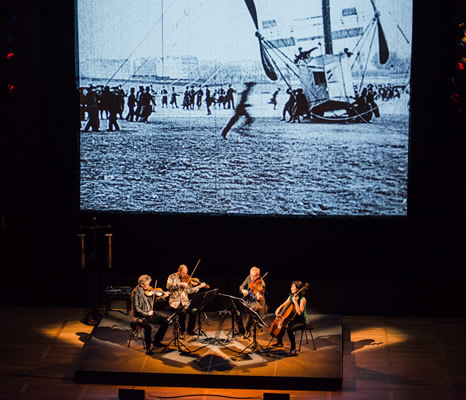Memorial Hall, on the campus of the University of North Carolina at Chapel Hill, is no stranger to historical retrospectives, but Carolina Performing Arts’ presentation of a program called Prelude to a Black Hole was unique in many respects. Featuring the one-of-a-kind Kronos Quartet, the program was a brilliant multi-faceted depiction of a remembrance of the 100th anniversary of the start of World War I as well as a tour of the significant artistic developments occurring during that period.
It was a sad and sobering coincidence that a program showing the futility and insanity of war would take place just days after the horrible killings of three students nearby the UNC campus. Emil J. Kang, Executive and Artistic Director of Carolina Performing Arts, gave a moving and eloquent statement honoring these victims of horrendous, senseless violence. A moment of silence provided a communal meeting of deep and dark quiet that was overwhelming in its quiet power.
Starting out forty years ago as a derisively-labeled avant-garde or even counter-culture string quartet, the Kronos Quartet is now firmly established as the most consistently influential and innovative new music ensemble, arguably of all time. The statistics on their recordings, commissions, world premieres, and collaborations with artists of every conceivable genre and culture are so staggering as to almost defy belief. Equally amazing is that three of the members, David Harrington and John Sherba, violins, and Hank Dutt, viola, have been with the group since its inception. Cellist Sunny Yang joined the group in June 2013.
This program was, in part, a collaboration among Kronos, composer Aleksandra Vrebalov (b.1970) and filmmaker Bill Morrison. This work, commissioned by Cal Performances, the National World War I Museum, and Dartmouth College, is another example of the enormous resurgence of live music performance accompanying a film. Considered anachronistic and hopelessly old-fashioned for decades, you can now barely find an orchestra’s season where they don’t include a similar concert. But, the Kronos Quartet, being who they are, made this an experience all together moving and unique.
The program was actually a distinct triptych without the audience even realizing the structure. It’s not unusual to have music playing (usually generally going unnoticed) while the audience finds its seats, settles down, and waits for a performance to begin. The difference here was that what was being played was part of the concert. Basically, we were hearing examples of the earliest recordings from around 100 years ago: Edison cylinders and lesser-known devices with scratchy sounds of Chinese opera, Casals playing the first recording of the Bach suites, Rachmaninoff solos, and others. What a revolutionary concept that must have been!
Kronos came out and proceeded to play a remarkably eclectic mix of works that were written during the period of World War I, 1914-18, or whose composers flourished then. But first there was an eerie and other-worldly (I guess to Western ears) Byzantine chant by Vrebalov, the featured composer for the film at the end of the program. Harrington played a cantor-like modal plea while the others either had drones or spare sustained chords floating beyond.
Igor Stravinsky’s Three Pieces for String Quartet, has the composer in the midst of his great ballet successes and his developing neo-classical style, and Kronos played it just as Stravinsky demanded: according to the composer’s directions, no personal emotion permitted!
You cannot attend a Kronos Quartet concert without encountering composers and works you’ve never heard of, and that’s what’s so exciting about their performances. This program’s “unknowns” were Geeshie Wiley and Tanburi Cernil Bey. Wiley was a female American blues singer and guitarist and her “Last Kind Words” was an example of the way blues can be played by strings. Bey was an influential Turkish composer whose music allowed the group to demonstrate their fidelity to authentic performance practices of other cultures. They also revisited the very first piece they ever performed, more than forty years ago: the highly compressed, blink and you’ll miss it, Six Bagatelles, Op. 9, by Anton Webern. Perhaps the most unusual – and rare – work was Kronos playing a distinctly Charles Ives-like accompaniment to the composer himself singing his song “They are There! Fighting for the People’s New Free World.” That tittle was meant to be sarcastic as Ives was virulently anti-war, proclaiming, “Most wars are made by small stupid selfish bossing groups while the people have no say.”
A stunningly beautiful Kronos-arranged section from Rachmaninoff’s All-Night Vigil led directly into the featured portion of the program: Bill Morrison’s meticulously researched collection of archival World War I footage that was set to an original score by Aleksandra Vrebalov, born in the former Yugoslavia. Morrison did not attempt to “clean” up these 100-year-old images, retaining the visual damage and static as a metaphor of this “war to end all wars” as the start of the disintegration of civilization as we knew it. Vrebalov’s music, which came first, with the film edited for the score, ranged from depictions of the pomposity and arrogance of those who lead us into war to searingly loud and angry sections reminiscent of Penderecki’s Threnody to the Victims of Hiroshima. While Kronos subsided to a quasi-peaceful passage, a final, somewhat lengthy image of a descending parachute served only to scoff at the irony that this end might be the worst that we’d need to endure.
As powerful and moving as this program was, it did not compare with an encore that, surrounding recent events, was emotionally explosive. Harrington simply said “in memory of Deah Shaddy Barakat, Yusor Mohammad Abu-Salha, and Razan Mohammad Abu-Salha we will play “The Beatitudes” by Vladimir Martynov.” This is possibly the most sublime, peaceful, heart-wrenching music that has been written in decades, and its effect was visceral and palpable. It simultaneously grieves but gives solace and hope. There could not have been anyone not affected by this monumental example of the effect of music.











